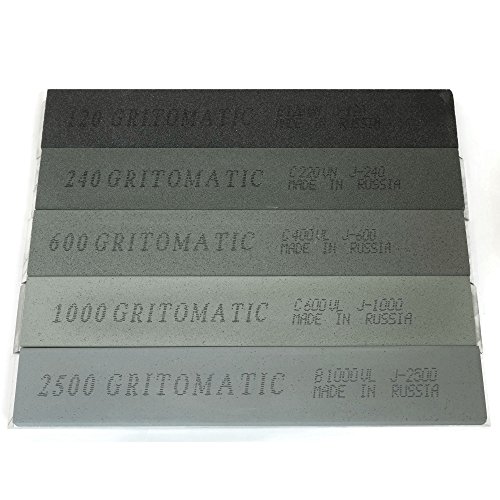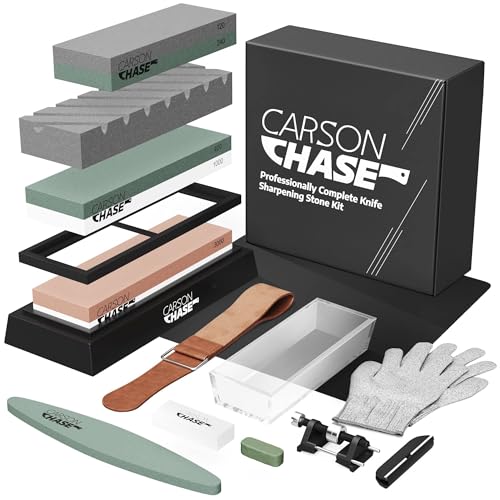
Silicon carbide is a popular choice for knife sharpening due to its abrasiveness and durability. This compound is made up of silicon and carbon, which combine to form a hard, abrasive material that is perfect for sharpening purposes.
One of the main advantages of using silicon carbide for knife sharpening is its ability to remove material quickly and efficiently. The abrasive particles in silicon carbide are sharp and aggressive, allowing them to easily cut through metal and remove dullness from blades.
Additionally, silicon carbide is a versatile compound that can be used on a wide range of knife materials, including stainless steel, carbon steel, and ceramic. It is also effective at sharpening both straight and serrated blades, making it a versatile choice for knife enthusiasts.
Furthermore, silicon carbide stones and abrasives are known for their durability and long lifespan. They are less prone to wear and tear compared to other sharpening materials, making them a cost-effective option in the long run.
In conclusion, silicon carbide is an excellent choice for knife sharpening due to its abrasiveness, versatility, and durability. Whether you are a professional chef or a knife enthusiast, using silicon carbide stones or abrasives can help you achieve razor-sharp edges on your blades.
Overview of Silicon Carbide
Silicon carbide is a popular choice for knife sharpening due to its excellent abrasive properties. It is a compound composed of silicon and carbon, with a chemical formula SiC. Silicon carbide is a hard material, rated at 9-9.5 on the Mohs hardness scale, making it one of the hardest abrasive materials available.
Properties of Silicon Carbide
There are several properties that make silicon carbide ideal for knife sharpening:
- Hardness: As mentioned earlier, silicon carbide is extremely hard, allowing it to effectively remove material from the knife blade. This hardness ensures a consistent and even sharpening process.
- Abrasive properties: Silicon carbide has excellent abrasive properties, allowing it to quickly and efficiently remove dullness and create a sharp edge on the knife blade. Its abrasive nature helps in achieving a finer and more precise edge.
- Durability: Silicon carbide stones are known for their durability and long lifespan. They can withstand heavy use without losing their abrasive properties, making them a reliable choice for frequent knife sharpening.
- Versatility: Silicon carbide stones are available in various grits, ranging from coarse to fine. This allows users to tailor their sharpening process based on their needs, ensuring optimal results for different types of knives and cutting tasks.
Uses of Silicon Carbide in Knife Sharpening
The abrasive nature of silicon carbide makes it suitable for various knife sharpening applications. It is commonly used for:
- Restoring dull blades: Silicon carbide stones are effective in removing nicks, chips, and other imperfections from knife blades, restoring their sharpness.
- Creating a new edge: Silicon carbide stones can be used to create a new bevel or edge on a knife blade, particularly when reshaping or reprofiling is desired.
- Sharpening different types of knives: Whether it’s a kitchen knife, pocket knife, or hunting knife, silicon carbide stones can be utilized to sharpen a wide range of blades, enhancing their cutting performance.
In conclusion, silicon carbide is an excellent choice for knife sharpening due to its hardness, abrasive properties, durability, and versatility. It helps achieve a sharp and precise edge, making it a popular option among knife enthusiasts and professionals.
Benefits of Silicon Carbide for Knife Sharpening
When it comes to knife sharpening, choosing the right abrasive material is essential to achieve the best results. One such material that has gained popularity among professional chefs and knife enthusiasts is silicon carbide.
Silicon carbide is a synthetic compound that is extremely hard and durable, making it an excellent choice for sharpening knives. Here are some benefits of using silicon carbide for knife sharpening:
| 1. Superior Sharpening Power: | Silicon carbide has a high level of abrasiveness, which allows it to remove metal quickly and efficiently. This means that you can achieve a razor-sharp edge on your knives in a short amount of time. |
| 2. Versatile Grit Options: | Silicon carbide sharpening stones are available in various grits, ranging from coarse to fine. This allows you to choose the right grit for the level of sharpness you desire. Coarser grits are ideal for reprofiling and repairing damaged blades, while finer grits are perfect for honing and polishing. |
| 3. Longevity: | Due to its hardness and durability, silicon carbide sharpening stones have a longer lifespan compared to other abrasives. This means that you can use them for a longer period of time before needing to replace them, making them a cost-effective choice in the long run. |
| 4. Compatibility: | Silicon carbide sharpening stones can be used with a variety of knife materials, including stainless steel, carbon steel, and even ceramic. This makes them a versatile option that can be used for sharpening different types of knives in your collection. |
| 5. Easy Maintenance: | Unlike some other sharpening materials, silicon carbide stones require minimal maintenance. They can be cleaned easily with water and a brush, making them convenient and hassle-free to use. |
Overall, the benefits of silicon carbide for knife sharpening make it a popular choice among professionals and enthusiasts alike. Its superior sharpening power, versatile grit options, longevity, compatibility, and easy maintenance contribute to achieving optimal sharpness and prolonging the lifespan of your knives.
How to Use Silicon Carbide for Knife Sharpening
Using silicon carbide for knife sharpening can be an effective method to restore a sharp edge to your blades. Silicon carbide, a popular abrasive material known for its hardness and durability, can provide excellent results when used correctly.
1. Prepare Your Sharpening Tools
Before you begin, gather the necessary sharpening tools. This can include a silicon carbide sharpening stone or a sharpening block with silicon carbide abrasives. Ensure that your silicon carbide stone or block is clean and free from debris that may affect the sharpening process.
2. Apply Lubrication
It’s important to use a lubricant when sharpening with silicon carbide to prevent the stone or block from clogging. Water or honing oil can be used as a lubricant in the sharpening process. Apply a few drops of lubricant to the stone or block to ensure a smooth and effective sharpening experience.
3. Angle and Pressure
When sharpening your knife, it’s crucial to maintain a consistent angle and apply proper pressure. Hold the knife firmly and position the blade against the silicon carbide stone or block at the desired angle. Use controlled movements and apply light to moderate pressure while maintaining the angle throughout the sharpening process.
4. Sharpening Techniques
There are different sharpening techniques you can use with silicon carbide. One common technique is to move the knife in a sweeping motion while maintaining the angle against the stone or block. Alternatively, you can use a circular motion to achieve the desired sharpness. Experiment with different techniques to find the one that works best for you.
5. Test and Repeat
After sharpening, it’s important to test the knife’s sharpness. Carefully run your finger or thumb across the blade’s edge (taking necessary precautions to avoid injury). If it feels sharp and cuts smoothly, you’ve successfully sharpened your knife. If not, repeat the sharpening process, making sure to maintain the angle and pressure consistently.
By following these steps and using silicon carbide for knife sharpening, you can restore the sharpness and effectiveness of your blades. Remember to take your time, practice proper technique, and prioritize safety throughout the sharpening process.






